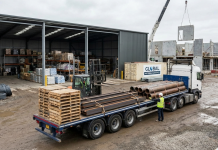The construction industry faces an unprecedented digital transformation challenge, with 73% of companies failing to capture business value from digital transformation efforts according to research commissioned by Klipboard.com, a business management software service. While other industries have embraced digitization, construction remains the second-least digitized industry globally on McKinsey’s digitization index, creating a productivity crisis that costs the sector trillions in unrealized value.
“We’re seeing the same patterns repeat across the industry,” says Gabriel Cohen, Vice President of Go-to-Market at Klipboard. “Companies invest heavily in technology but struggle with implementation and change management. The ones that succeed treat digital transformation as a business process challenge, not just a technology purchase.”
Despite $50 billion invested in construction technology between 2020-2022 (85% higher than the previous three years according to McKinsey research), most firms still struggle with implementation, change management, and realizing measurable returns on their technology investments.
Construction Remains Digital Laggard
The numbers paint a sobering picture. Construction ranks second-to-last in digital adoption in the United States and dead last in Europe, according to Whatfix research. This puts the $12 trillion global industry at a significant competitive disadvantage.
Construction productivity has grown at only 1% annually over the past two decades, compared to 2.8% for the total world economy, McKinsey analysis shows.
While Building Information Modeling (BIM) has achieved 68% global adoption, emerging technologies lag dramatically. Only 37% of construction businesses use AI/ML and robotics adoption sits at just 18% globally, according to Deloitte’s 2025 research.
“The BIM adoption numbers look encouraging until you realize that many companies are using it as an isolated tool rather than part of an integrated workflow,” Cohen explains.
Technology Investment Surges Despite Implementation Challenges
The market shows strong momentum despite adoption struggles. The AI in construction market is projected to grow from $3.99 billion in 2024 to $11.85 billion by 2029, according to industry forecasts. Construction software markets overall are expected to reach $8.99 billion by 2034, up from $3.72 billion in 2024.
77% of construction companies expect increased technology investment this year, with over 50% anticipating 11%+ budget increases, recent surveys show.
What Separates Winners from Losers
Successful implementations follow consistent patterns. Leadership commitment proves essential, with C-level sponsorship correlating strongly with positive outcomes.
Platform integration delivers superior returns compared to point solutions. Companies now offering solution suites addressing more than 5 use cases increased to 20% from 13% in 2017, according to industry analysis.
“The most successful implementations we see start with understanding current workflows and pain points,” notes Cohen. “Companies succeed because they focus on solving real business problems first, then build technology around those solutions.”
Market forces are accelerating transformation requirements as clients demand data transparency and labor shortages make productivity improvements essential. 45% of workers cite burnout as the top reason for leaving the industry, according to Procore research.
“The window for gradual adoption is closing,” Cohen warns. “Companies that don’t embrace comprehensive digital transformation in the next few years will find themselves at a significant competitive disadvantage.”








